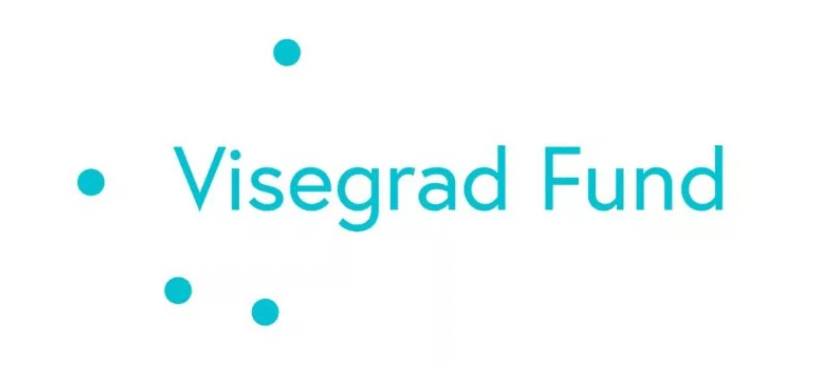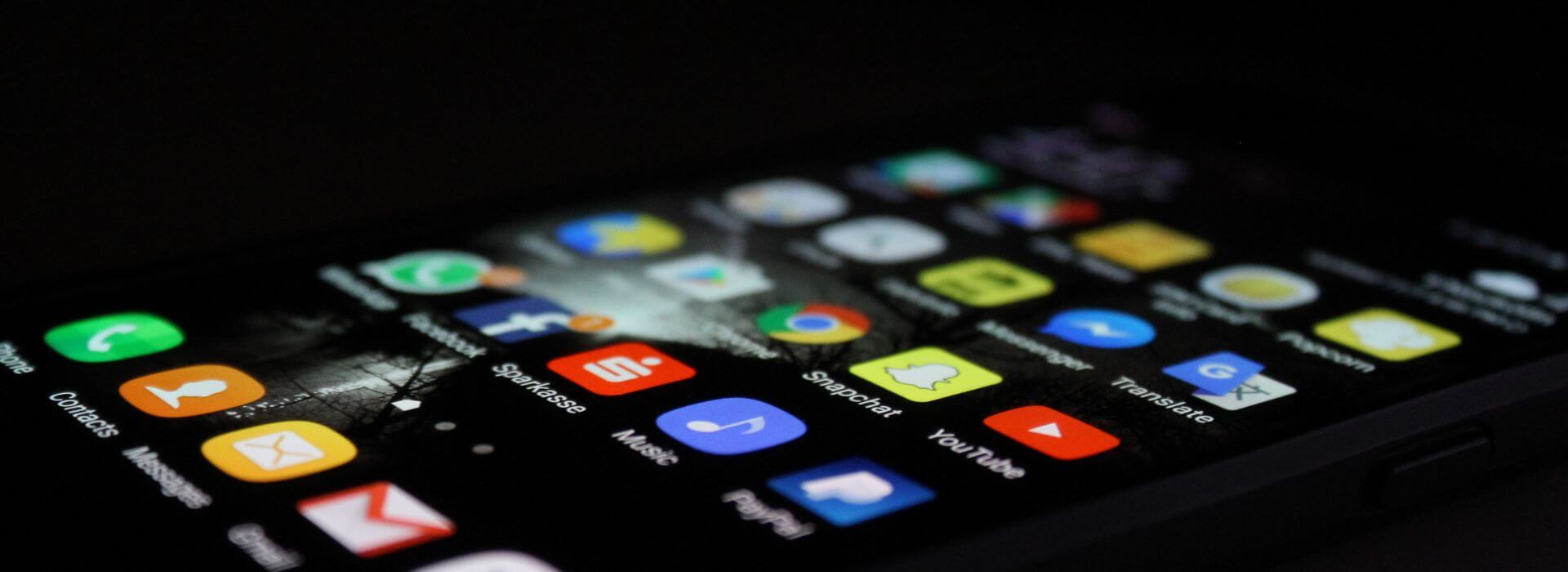The major objective of Russian information policy and disinformation actions — both prior to the aggression as well as during the war in Ukraine — is the desire to break up the unity of European countries and NATO.
Russia wants to strengthen its position by way of building antagonisms between countries and inside individual countries and their societies. It also aims to blame the West for the war in Ukraine. This article presents key narratives present on the Polish internet — mainly disinformation — which slander the various countries or their governments. Among these are also narratives that are directly aimed at creating hostility among societies.
Even before the war, narratives emerged on the internet saying that the U.S. and European Union appear to care about the safety of Eastern Europe. In reality what counts are the hard interests i.e. the sale of weapons and the purchase of energy resources. Countries like Germany, France and Hungary are presented — in various contexts and configurations — as more or less staunch Putin’s allies. What is also clearly visible on the Polish internet is the play on stereotypes and historical prejudices and the process of building up hostility towards the EU.
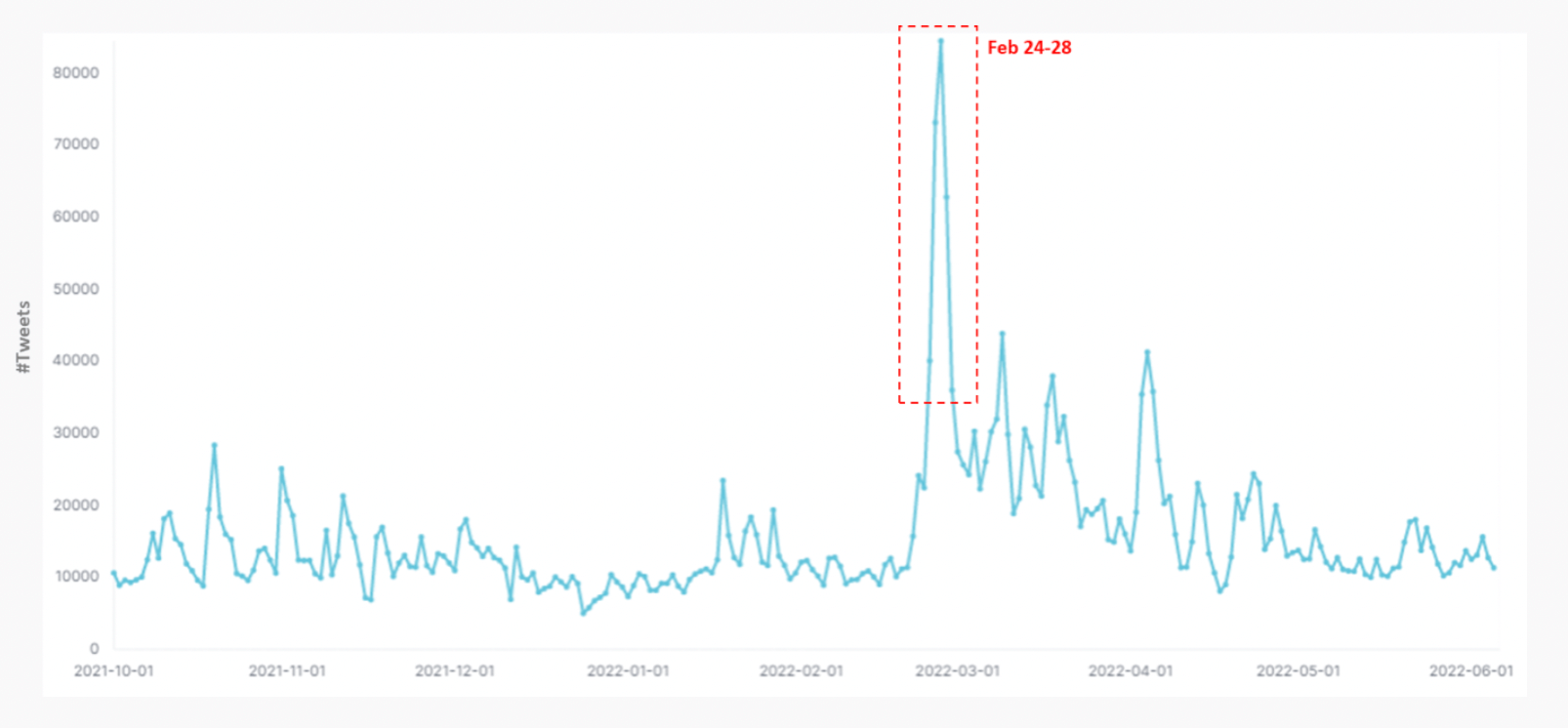
Figure 1: A wave of entries involving Germany immediately after Russia’s invasion of Ukraine.
The Ribbentrop-Molotov Pact Between Russia and Germany in the 21st century
The most criticised for their attitude towards the war in Ukraine are Germans. There are so many anti-German narratives on the Polish internet that in order to present them, it is necessary to group them into a few blocs under suggestive names — Passivity, Mistakes, and Betrayal.
Passivity — On the internet, the Germans are most often accused of sabotaging NATO actions (e.g. blocking the delivery of British planes with military aid for Ukraine, delivery of old equipment in symbolic quantities) and by-passing sanctions put on Russia. The hesitancy of German authorities in the area of military aid for Ukraine is incomprehensible and is being used to build anti-German narratives. This reinforces existing anti-German sentiments. There are numerous messages on the Web asserting that Germans do not care about Ukraine’s independence but only are interested in profits from the investments in rebuilding Ukraine after the war ends (‘chequebook’ politics).
Since the eruption of war in Ukraine, a narrative has been developed according to which Olaf Scholz is a chancellor with a post-GDR (East German) mentality indoctrinated by Russians. He was an opponent of the presence of American Pershing rockets in West Germany, a Stasi collaborator, a friend of Egon Krenz — a Communist. Even the June decision about Germany handing over to Ukraine the IRIS-T anti-air defence system often appears with a comment that it will take months for the process to be completed — ‘too little too late.’ The result of such actions, on part of the German authorities, is that the Internet has already decided — in advance of the decision-makers — that the German authorities are not welcome in Kyiv. Meanwhile, the dominant majority of Germans support humanitarian aid to Ukraine and half of them support the idea of offering them heavy military equipment.
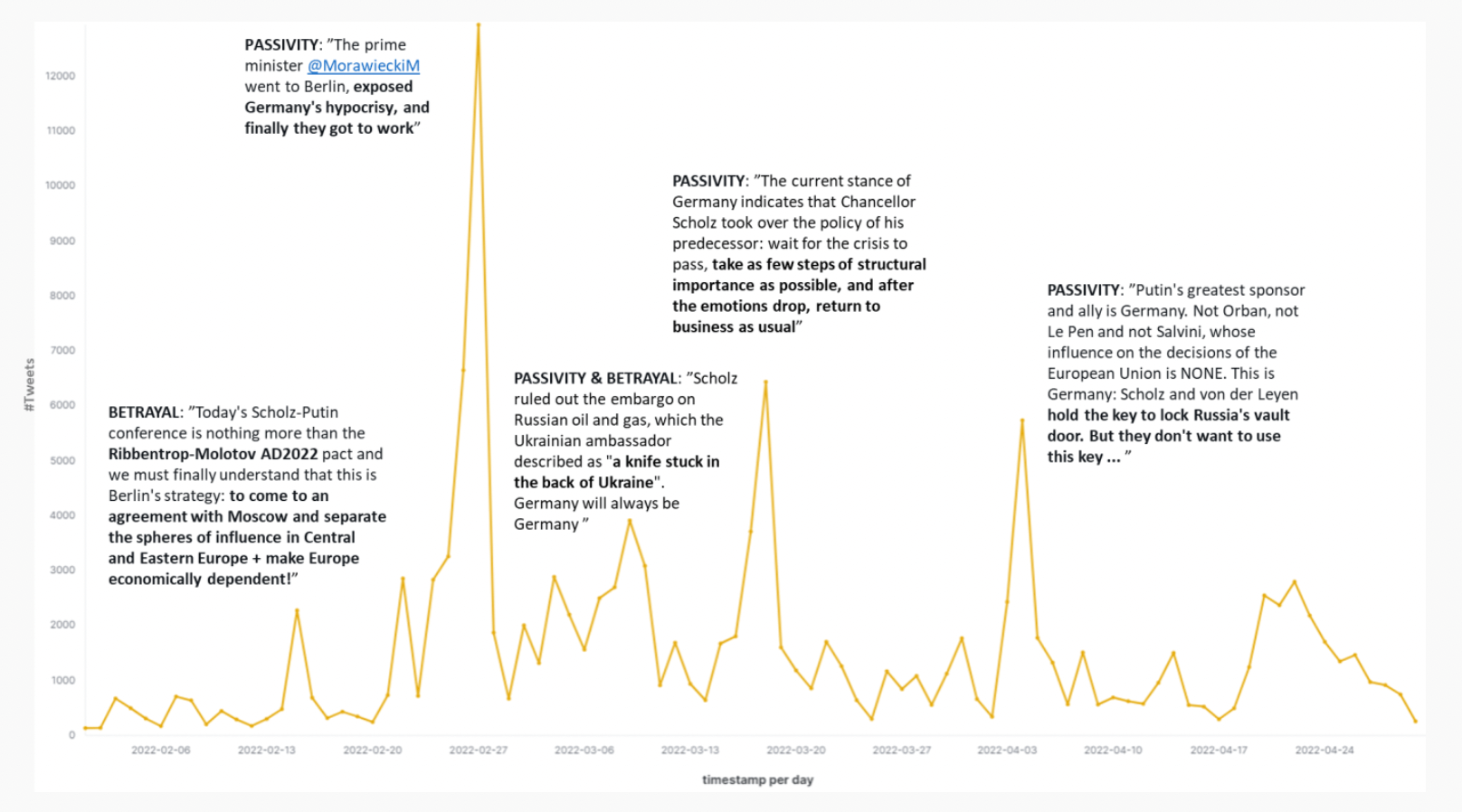
Figure 2: Entries involving Olaf Scholz – PASSIVITY & BETRAYAL
Mistakes — Today on the internet, the Germans have become a synonym of an erroneous policy towards Putin conducted long before the war, for example, by way of a strong energy alliance with Russia — the dominant message being: ‘Germans prefer gas than the atom and are forcing the whole of Europe into a pact with Russia.’ Thus allowing Putin to finance today’s war in Ukraine thanks to the Nord Stream pipeline. Posts about chancellor Merkel’s decision in 2008 to block Ukraine from inclusion in NATO structures add fuel to the fire. Trust in German politicians is permanently undermined with reminders of the example of chancellor Schröder and his career in Russian business.
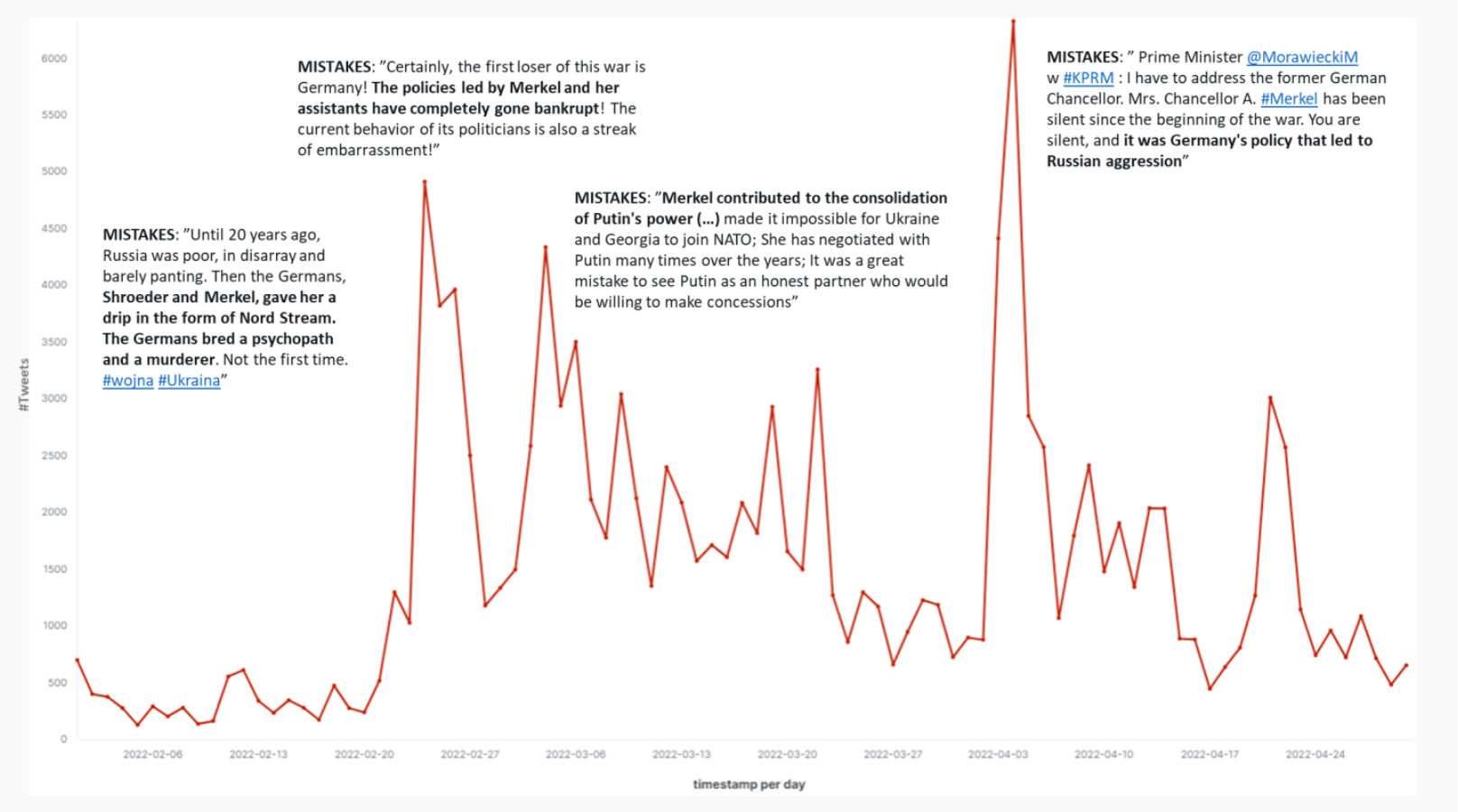
Figure 3: Entries involving Angela Merkel – MISTAKES
Betrayal — ‘Poland and Ukraine have been sold to Russia by the U.S. and Germany long before the war began’ — supposedly this was to have taken place when the U.S. waived the sanctions and came to an agreement with Germany to complete NS2. This action was to embolden Putin and at the same time weaken the energy safety of Poland and Ukraine. In the summer of 2021, online narratives started to suggest that chancellor Merkel used the difficult situation of the new U.S. administration — which needed Germany’s alliance against China — to abolish the sanctions and complete NS2. Theories emerged about the U.S. elections being falsified and that Donald Trump had to leave in order for Germany and Russia to be able to complete their investment. The Germans, in various ways, are presented as enemies of Central-Eastern European countries starting with the reminder of difficult historical experiences pertaining to the cooperation between Russia and Germany over the heads of other countries mainly during the second world war — ‘NS2 is a new Ribbentrop-Molotov Pact.’ Today, Ukraine is once again to be betrayed by Germany which does not want to offer them military support. They do however want to profit from the war and the reconstruction of Ukraine after the war. And above all, they want to continue to conduct their lucrative business with Putin.
Western countries de facto support Russia’s actions
Any setbacks — and internal antagonisms within specific countries exposed during election campaigns — signs of refraining and even gaffes committed by western leaders are presented on the internet as evidence of a supposedly absent unity of the West and its weakness towards Russia. In the Autumn of 2021, there emerged narratives promoting the hypothesis that Putin is the biggest winner of the negotiations on NS2. The President of Russia made no concessions while poisoning Navalny, supporting the Lukashenka regime and conducting cyberattacks against the U.S. — he received a ‘prize’ in the form of billions of euros which he was to earn from the gas sent through the new pipeline.
‘Sleepy Joe’
A wave of narratives on the internet accusing Biden of submission to Putin appeared in the context of the Putin-Biden meetings in June and December of 2021 which were presented as a win for the Russian President — ‘Putin is using Biden’s weakness,’ ‘Weak U.S. and strong Russia.’ This type of narrative was heated up by posts about the poor health of the American President — ‘Sleepy Joe.’
Biden’s remarks were used by U.S. opponents in order to show the inhabitants of Ukraine and Poland that the U.S. will not react to Russia’s ‘small’ military actions — ‘minor incursions’ — on Ukrainian territory. This statement was presented as permission for Russian intervention in Ukraine — ‘Biden is giving Putin the green light to go into Ukraine.’ The image of gen. Donahue leaving Afghanistan as well as those of the internal dispute in the U.S. Congress in reference to sanctions against Russia were used to undermine the trust in the alliance with the U.S.
Supporters of former President Trump are very active. They pursue a simple message: ‘taking into account the global security interests, the relations between the previous U.S. administration and Russia were more beneficial to the world and especially to the U.S. allies.’ According to them, the war in Ukraine would not have taken place if Trump was president.
The French ‘collaborator’
France is presented by internet users as a ‘historical collaborator’ — take the example of the Vichy government — a state that is in fact weak and traditionally pro-Russian. By creating the impression that the difficult situation in Eastern Europe is the fault of bad government of current EU leaders such as Macron, Le Pen was able to build her position. The presidential campaign in France took place against the backdrop of the war in Ukraine. Macron wanted to be perceived as a strong European leader able to influence the solution to the war in Ukraine. However his activity was used to spin narratives about submissiveness and collaboration — frequent contacts with Putin at the initiative of the French president, avoiding unequivocal statements condemning Russia’s actions or the sales of arms to the Russians despite the sanctions. In order to further undermine Macron’s position, the internet recalls his words about ‘the brain death of NATO.’ As a result the French president is presented as ‘Putin’s man.’
The Hungarian ‘patriot’
Also in Hungary the topic of war in Ukraine has dominated the election campaign, becoming an element of the internal game to capture votes. According to many internet narratives: ‘Hungary has become a model of state behaviour during the crisis in Ukraine.’ After the first comments criticising Hungary’s behaviour towards the conflict in Ukraine there appeared posts suggesting that it is a good direction — a much safer one than the behaviour of Poland — ‘Orban is right.’ Orban was portrayed as a leader who, most of all, takes care of his own nation and its safety — often either bypassing or downplaying the topic of his support of Putin and his criticism of Zelenskyy. According to this theory ‘within the EU, only Orban will come out as a winner from this conflict because he will maintain the beneficial contracts for his country and secure its safety’ — also in terms of energy safety. What’s more, he will bear no consequences from NATO or the EU.
‘Sanctions’ against Poland
On the Polish internet, the EU has become a ‘whipping boy’ which with the support of the Polish opposition has demanded, among others, the lifting of regulations affecting judicial independence in exchange for lifting the blocking of payments from EU funds. Many internet users, mainly supporters of the right side of the political spectrum, propagate narratives showing Poland as a country which helps the Ukrainians the most and at the same time is punished financially by the EU — ‘the EU is a German-Russian condominium.’ This narrative can be summed up in the statement that: ‘instead of punishing Russia, the EU introduces sanctions against Poland.’
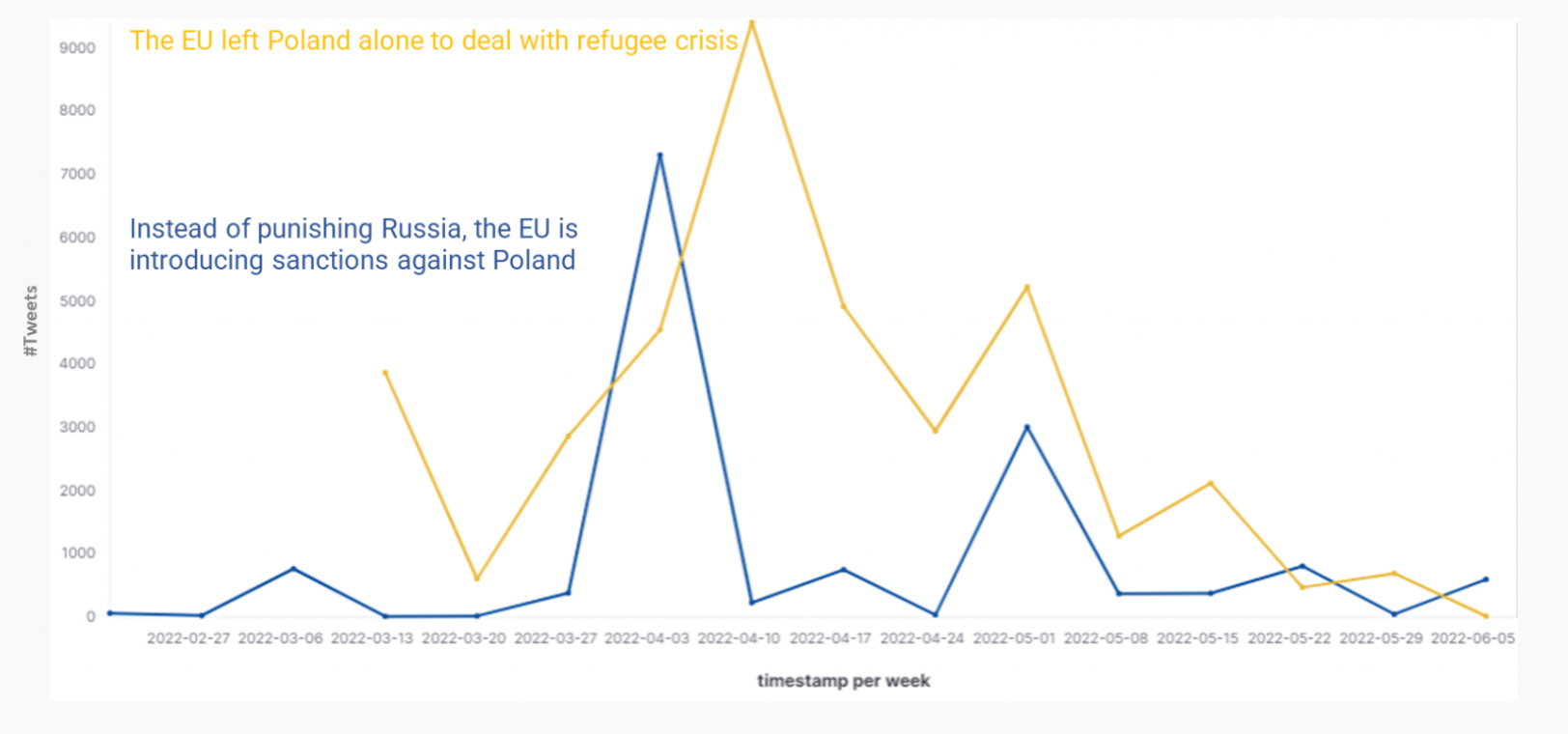
Figure 4: EU as a ‘whipping boy’
On the one hand, the aim of this is to slander the EU in the eyes of Poles while on the other hand, it is to justify the difficult economic situation of Polish society. This is connected to the rise of prices of gas and electricity as well as indicating the EU as a major culprit in this situation — ‘the EU is responsible for the increase of electricity prices, while the U.S., Germany, and Russia are responsible for the rise in the prices of gas.’ The June visit in Warsaw of the president of the European Commission, which the Polish state media presented as the ‘Polish government’s negotiating success,’ has increased the negative emotions towards the EU even among internet users who support the opposition — they feel cheated.
This shows how difficult it is to pursue an accurate informational policy in the era of electronic media and the use of short messages imposed by social media. In analysing the web, one can, with no doubt, claim that Putin still has not lost the information war and is effectively dividing the societies of the EU and NATO.
—
ABTShield Team: Jerzy Smoliński, Jakub Jasiński, Agnieszka Wnuk with collaboration from: Anna Jórasz-Żak
The article is based on data and analysis gathered by abtshield.com as well as materials and summaries prepared by IBIMS.pl
This article is part of the project: New Propaganda and Disinfo in CEE which involves numerous partners from across the region and is supported by the International Visegrad Fund. Click here for more information on the project.
